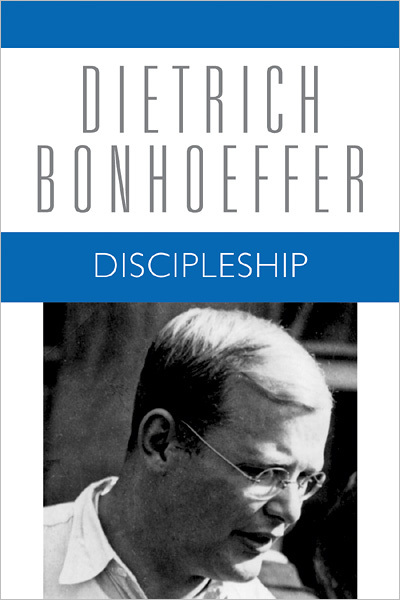'Cheap grace means justification of sin but not of the sinner. Because grace alone does everything, everything can stay in its old ways' (43).
'[Such] grace takes care of everything by itself.... Cheap grace is grace without discipleship, grace without the cross, grace without the living, incarnate Jesus Christ' (44).
'[O]nly those who are obedient can believe' (47).
It is pretty easy to see how this chapter can serve as a call to wake from slumber and cross the line from religion to active faith.
Reading it again at Trinity College this week -- this time in the unabridged fresh translation provided in Dietrich Bonhoeffer Works -- I am struck again not only at its personal impact but also at how resistant Bonhoeffer is to letting it be merely so. Indeed, this is a book that is profoundly social and political -- so much so that one can hardly conceive of Christianity any other way.
Consider excerpts such as these, not only for their timely call to public, protestant Christianity, but also their polemic against the dutifully secular relegation of faith to the privacy of the inner life:
'The expansion of Christianity and the increasing secularization of the church caused the awareness of costly grace to be gradually lost. The world was Christianized; grace became common property of a Christian world. It could be had cheaply' (47).
'Monastic life thus became a living protest against the secularization of Christianity, against the cheapening of grace. But because the church tolerated this protest and did not permit it to build up to a final explosion, the church relativized it... For now monastic life became the extraordinary achievement of individuals, to which the majority of church members need not be obligated' (47).
 |
| from the movie 'Luther' |
'Luther's path out of the monastery back to the world meant the sharpest attack that had been launched on the world since early Christianity. The rejection which the monk had given the world was child's play compared to the rejection that the world endured through his returning to it. This time the attack was a frontal assault. Following Jesus now had to be lived out in the midst of the world. What had been practiced in the special, easier circumstances of monastic life as a special accomplishment now had become what was necessary and commanded for every Christian in the world' (48).
'Grasping at forgiveness was the final radical rejection of self-willed life; the acknowledgment of grace itself was his [Luther's] first really serious call to discipleship' (50).
Keep in mind that Bonhoeffer is writing these things before the Nazi threat had become obvious to the world; when the church was a well-meaning frog slowly boiling in the kettle of lordless powers. Before the imprisonment and hanging that made Bonhoeffer a Christian hero, he was exiled by his country and church. By elevating him as a hero rather than hearing his insistence on normalcy, do we distance ourselves from his call to discipleship?
(quotes from Dietrich Bonhoeffer Works, vol. 4,
translated by Barbara Green and Reinhard Krauss
and published by Fortress Press in 2003).
translated by Barbara Green and Reinhard Krauss
and published by Fortress Press in 2003).

No comments:
Post a Comment